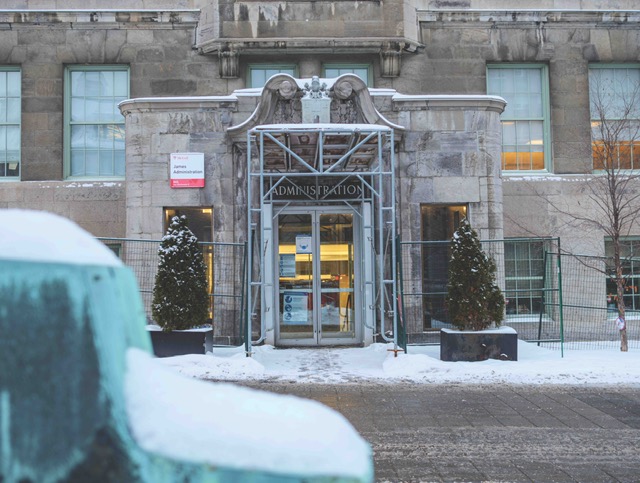An open letter, written and published just hours after McGill’s Jan. 14 announcement that in-person learning would recommence on Jan. 24, has been circulating among the student body. The letter, titled “Open Letter to the McGill Administration – Return to in-person learning on January 24th,” denounces the administration’s decision to return on the 24th, contending that it ignores and dismisses the reality of the pandemic. As of Jan. 17, the petition has garnered close to 22,000 signatures.
Written and drafted by U1 Arts student Lavinia Auhoma and co-written by the Students’ Society of McGill University (SSMU) vice-president (VP) University Affairs Claire Downie, the letter calls on the administration to mandate hybrid learning strategies, regulate the supply of adequate Personal Protective Equipment (PPE) for the community, and release a more detailed plan for an eventual move to in-person learning. The writers also demand a comprehensive account of McGill’s contact tracing procedures and methodology, both on and off campus.
The letter has been signed by members of the McGill community—including students, faculty, and parents—along with faculty and staff from other Canadian universities, such as Concordia University and the University of Toronto.
In an interview with The McGill Tribune, Auhoma noted that she was compelled to write the letter after reading McGill’s announcement which, in her view, dismissed and downplayed the reality of the ongoing pandemic.
“I think everyone knows someone else who has COVID, maybe right now,” Auhoma said. “As the situation developed so rapidly, and with how unpredictable it was, I found it quite reckless and a bit shocking of McGill to carry on with its decision to open up so promptly. I think we even see in the specific language of the email, ‘Despite the rising case count in Quebec,’ [that] there is a lot of language that downplays the severity of COVID.”
Auhoma believes that McGill’s decision prioritizes students’ desire for a regular university experience, rather than public safety at large, noting that it ignores members of the McGill community who are immunocompromised or vulnerable.
“I think they’ve pushed forward with this in-person messaging to appease a big population of the student body who just want their university experience back,” Auhoma said. “I do want my university experience, but I don’t want it at the cost of people’s lives [….] And when McGill is dismissing that plea, because it wants to reflect the majority, I think the minority deserves to be heard too.”
McGill has followed through on its plan to resume in-person learning for most classes consisting of less than 200 people, despite the high case count in Quebec and the province’s limited testing capabilities. In a statement to the Tribune, McGill media relations officer Frédérique Mazerolle justified McGill’s decision to move in-person, citing Quebec’s public health guidelines and the McGill community’s vaccination rate.
“McGill has an excellent track record in keeping our community safe,” wrote Mazerolle. “Although there have been cases on campus, safety measures have worked [….] Nevertheless, our planning for Winter 2022 remains flexible and if the COVID-19 situation changes, we have contingency plans in place. We are monitoring the situation extremely closely and are prepared to act quickly in line with public health directives.”
In an interview with the Tribune, Downie questioned the university’s assertion that it would pivot to online if the situation worsens. The unclear case counts due to the lack of available tests in the province, coupled with McGill’s decision to move academics in-person amid rising hospitalizations, led her to question McGill’s metric for being able to return to campus.
“I have been asking this question of administration members, what metrics they would use to decide that things […] aren’t going as well as they need them to be or what they’re willing to handle,” Downie said. “You can’t really get a PCR test in Quebec, unless you’re a member of a specific group. So I just assume that there will be outbreaks, but that there will be no real way for the university to confirm that they have occurred.”
While the letter has garnered much support, it has also been controversial. Some students, like Adam Menikefs, U2 Arts, are concerned that the letter does not take full account of the marked differences in this phase of the pandemic, notably the low hospitalizations, deaths, and vaccination rates among the 20-29 age group.
“I do not want to invalidate people’s concerns, [but] some students I believe have yet to treat the current situation to what it will become, an endemic,” Menikefs wrote in a message to the Tribune. “Obviously I do not agree that everyone should be forced back, and accommodations should be made for those who are immunocompromised or live with high risk individuals, but [I] also think it is difficult to assume that McGill can make an entire decision based on individual accommodations.”










